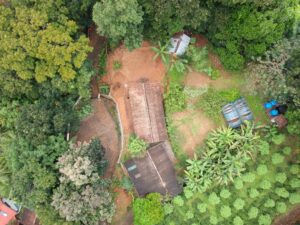Since the devastating fire at the Rosyth Tea factory in April 2022, not owned by the Rosyth Estate House, we have worked hard to support and to find employment for as many of the workers as we could. Currently we are happy to report that we have employed 18 on our estate, tapping rubber, plucking tea, clearing and weeding – which is now looking very well maintained.
With the assistance and advice from members of the community of the Ceylon Artisanal Tea Association (CATA), we are now on our new journey.
We have set up the Rosyth Foundation; the foundation will operate a micro artisanal tea factory, handcrafting teas, significantly adding to the value addition & giving the tea workers 10% of the income from the sale of the teas, materially boosting their earnings. The profit from the venture will be used to improve the living conditions including the housing and education of the local community. We hope that this will give the tea workers an opportunity to be proud of their endeavours in producing high quality tea & improve the living standards for the local community.


DCIM/100MEDIA/DJI_0176.JPG 
DCIM/100MEDIA/DJI_0181.JPG
In the past few days, we have cleared the site for the new building, our architect provided the first drawings, we are hiring a new person to lead the venture and we are engaging with the Tea Board and other interested parties. In the meantime, we have started experimenting with small batch production of handmade teas. The journey to artisan tea production has begun at the Rosyth Estate.
More about the Ceylon Artisanal Tea Association – CATA was started by seven artisanal tea gardens in the Kandy, Ruhunu, Sabaragamuwa, and Uva growing regions to promote the production and sale of unique handcrafted teas from Sri Lanka, increase the incomes of small-scale farmers, tea workers, and rural communities, and preserve and restore the natural environment. Members commit to sharing at least 2.5 percent of the revenues generated by artisanal teas with all of the workers engaged in the process from pluck to export. CATA supports collaboration between artisanal tea producers and makes it easier to share information, address common challenges, and market collectively. They increase the visibility of the community by participating in government meetings and organizing tours, webinars, and other unique tea experiences. Ceylon Artisanal Tea Association is registered as a not-for-profit organization.
